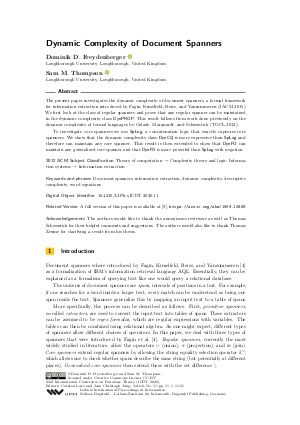LIPIcs.ICDT.2020.11.pdf
- Filesize: 0.69 MB
- 21 pages

 Creative Commons Attribution 3.0 Unported license
Creative Commons Attribution 3.0 Unported license

The present paper investigates the dynamic complexity of document spanners, a formal framework for information extraction introduced by Fagin, Kimelfeld, Reiss, and Vansummeren (JACM 2015). We first look at the class of regular spanners and prove that any regular spanner can be maintained in the dynamic complexity class DynPROP. This result follows from work done previously on the dynamic complexity of formal languages by Gelade, Marquardt, and Schwentick (TOCL 2012). To investigate core spanners we use SpLog, a concatenation logic that exactly captures core spanners. We show that the dynamic complexity class DynCQ is more expressive than SpLog and therefore can maintain any core spanner. This result is then extended to show that DynFO can maintain any generalized core spanner and that DynFO is more powerful than SpLog with negation.



















Feedback for Dagstuhl Publishing